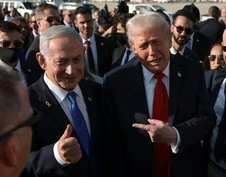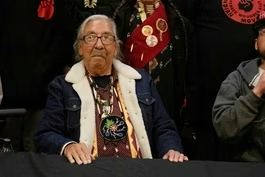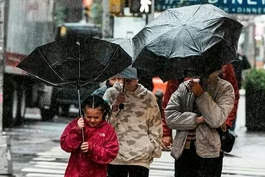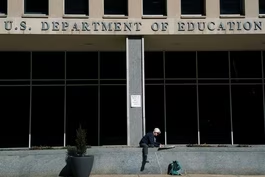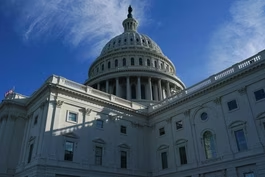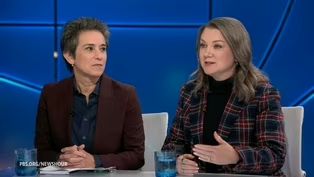
Israeli hostages freed after 2 years of brutal war
Clip: 10/13/2025 | 8m 36sVideo has Closed Captions
Israeli hostages freed and Palestinian detainees released after 2 years of brutal war
After two years of brutal war, 20 Israeli hostages and nearly 2,000 Palestinian detainees and prisoners were swapped as the American-led ceasefire in Gaza held. It was a day of hope and relief for many, tinged with apprehension of what lies ahead. President Trump received a hero's welcome in Israel and later led a peace conference in Egypt. Special correspondent Leila Molana-Allen reports.
Problems playing video? | Closed Captioning Feedback
Problems playing video? | Closed Captioning Feedback
Major corporate funding for the PBS News Hour is provided by BDO, BNSF, Consumer Cellular, American Cruise Lines, and Raymond James. Funding for the PBS NewsHour Weekend is provided by...

Israeli hostages freed after 2 years of brutal war
Clip: 10/13/2025 | 8m 36sVideo has Closed Captions
After two years of brutal war, 20 Israeli hostages and nearly 2,000 Palestinian detainees and prisoners were swapped as the American-led ceasefire in Gaza held. It was a day of hope and relief for many, tinged with apprehension of what lies ahead. President Trump received a hero's welcome in Israel and later led a peace conference in Egypt. Special correspondent Leila Molana-Allen reports.
Problems playing video? | Closed Captioning Feedback
How to Watch PBS News Hour
PBS News Hour is available to stream on pbs.org and the free PBS App, available on iPhone, Apple TV, Android TV, Android smartphones, Amazon Fire TV, Amazon Fire Tablet, Roku, Samsung Smart TV, and Vizio.
Providing Support for PBS.org
Learn Moreabout PBS online sponsorshipAMNA NAWAZ: Welcome to the "News Hour."
After two years of brutal war, 20 Israeli hostages and nearly 2,000 Palestinian detainees and prisoners were swapped today, as the American-led cease-fire in Gaza held.
GEOFF BENNETT: It was a day of hope and relief for many tinged with apprehension of what lies ahead.
There are harder steps still to come and no guarantees of success.
But a triumphant President Trump received a hero's welcome when he landed early today in Israel.
Later, he led a multinational peace conference in Egypt before flying home.
Special correspondent Leila Molana-Allen reports tonight from Tel Aviv.
LEILA MOLANA-ALLEN: Watching, waiting, hoping.
It was a day two years and many prayers in the making.
MIRIAM FELICITE, Tel Aviv Resident: Someone ripped our hearts, and now coming back.
LEILA MOLANA-ALLEN: Overwhelmed with emotion, they stood in tearful silence.
Since late last night, thousands of people have been gathered here at what's become known over the last couple of years as Hostage Square, the epicenter of the calls for the hostages to come home.
They waited with bated breath, watching the gradual releases on a large screen and hoping that, after today, the name here would become redundant.
And then the screams of joy began.
(CHEERING) WOMAN: The hostages are free!
LEILA MOLANA-ALLEN: As the Red Cross vehicles bearing their longed-for cargo drove slowly out of Gaza, well-wishers lined the roads by Israel's border.
The hostages were then flown by helicopter to specially prepared medical facilities.
As they appeared overhead, the crowds here erupted in elation.
One after another, the last of the living hostages were reunited with waiting family, an embrace they feared would never come.
But not everyone came home today.
Just four of the bodies of the 28 deceased hostages were returned.
Efrat Machikawa has been here for 30 hours and counting.
Six of her family members were kidnapped on October 7.
One was killed.
The other five returned home in previous handover deals after an agonizing wait.
EFRAT MACHIKAWA, Hostage Family Member: I mean, the atrocity that happened here is really beyond our understanding.
And then the long game that builds up to you and the fear of torture, of hunger, of threat for your beloved one.
Think of a brother, of a child, of a parent.
LEILA MOLANA-ALLEN: But, today, she's here to support the other hostages and their families whom she's grown as close to as her own.
EFRAT MACHIKAWA: We must have every single hostage until the very last one, because unless all of them are here, the healing of the state of Israel cannot start.
LEILA MOLANA-ALLEN: Cheering and waving American and Israeli flags, they watched the man they credit with seeing this deal through address the nation from Israel's Parliament.
WOMAN: Thank you, Trump!
Thank you, Trump!
LEILA MOLANA-ALLEN: The president proudly proclaimed the war was over, his praise for Israel's leader leavened with a warning, that it was time to turn the page.
DONALD TRUMP, President of the United States: Bibi, you're going to be remembered for this far more than if you kept this thing going, going, going, kill, kill, kill.
So, Israel, with our help, has won all that they can by force of arms.
You have won.
Now it's time to translate these victories against terrorists on the battlefield into the ultimate prize of peace and prosperity for the entire Middle East.
LEILA MOLANA-ALLEN: The Knesset was lit up red white and blue as the president sped off to another pressing appointment.
Hours behind schedule, Trump flew to the seaside resort city of Sharm el-Sheikh, Egypt, where he welcomed world leaders to the Gaza peace summit and commended Arab and Muslim leaders for what he called the biggest deal to have ever happened.
DONALD TRUMP: The Middle East, it's the biggest, most complicated deal, and also it's the place that could lead to tremendous problems like World War III.
They always talk about World War III would start in the Middle East.
And that's not going to happen.
LEILA MOLANA-ALLEN: Meanwhile, in the occupied West Bank, people flooded the streets to welcome home released Palestinian prisoners, families torn apart by years of confinement reunited.
At last with his loved ones, Kamal Abu Shanab says what he lived through was a nightmare.
KAMAL ABU SHANAB, Released Palestinian Prisoner (through translator): My weight was 280 pounds.
Today, I'm 150 pounds.
It was an indescribable journey of suffering, hunger, unfair treatment, oppression, torture and curses, more than anything you could imagine.
We escaped death.
LEILA MOLANA-ALLEN: His niece Farah struggled to hold back tears.
FARAH ABU SHANAB, Niece of Released Palestinian Prisoner (through translator): We're crying because we don't recognize him.
He's not the person we knew.
Our uncle doesn't look like our uncle.
It's unfair.
LEILA MOLANA-ALLEN: Many released today were convicted of terrorism offenses that killed Israelis and were serving life sentences.
But many others, among them women and children, were held under a policy allowing detention without formal charges.
Around 80 miles south in Khan Yunis in Gaza, a sea of people, as buses arrived with hundreds of Gazans who were detained by Israel over the last two years, a moment of raw emotion as a child kissed a father after an unbearable separation, and a father lifted a child who grew up in his absence.
For Gazans, this cease-fire is a moment to pause and grieve.
But even as Israeli strikes have stopped, killings and mayhem have not.
Today, Hamas publicly executed dozens of Gazans they accuse of collaboration with Israel.
Clashes have also erupted between Hamas fighters and other militias.
On Sunday, a prominent Gazan journalist, Saleh Aljafarawi, was killed by Israeli-backed militias.
Aljafarawi had survived and reported two years of death and destruction, while stealing moments of joy and humanity.
Palestinians, whether prisoners released today or families once again returning to Gaza City, are faced with a ravaged moonscape of ruins and rubble.
E'ETEDAL LOTFY, Displaced Palestinian (through translator): They could have saved us a long time ago instead of all this destruction and ruin.
What is left in Gaza?
There is nothing left in it except for its dead people.
We are dead, souls without bodies.
Tell us where to go, how many years before they build our homes.
LEILA MOLANA-ALLEN: A day filled with joy for many and one they hope will bring an end to this stage of a brutal war, but also a day filled with fear of what comes next -- Geoff.
GEOFF BENNETT: Did today play out as expected?
And based on your reporting, Leila, what comes next?
LEILA MOLANA-ALLEN: So it did initially play out as expected.
We were expecting all the hostages to come home today.
And, from the early morning, that is what happened, first a trench of seven living hostages and then 13 more living hostages were brought across the border by the Red Cross in vehicles.
They met with family members and doctors at a camp right on the Gaza border.
And then they were flown by helicopter to three different hospitals that had been placed and ready to receive them.
Now, they will in the coming days go through significant medical checks.
Of course, many of them have been without food.
Some have been beaten.
They will be in quite severe medical condition, and then the psychological support too.
But that is where things changed and things stopped going to plan.
What we saw next was supposed to be the release of the 28 bodies of the deceased hostages.
Now, a few days ago, Hamas had said they actually didn't know where all the bodies were, and it was confirmed by Israel that there would be a task force to go into Gaza to look for them.
But, today, this afternoon, Hamas then said they were actually only going to release four bodies of the deceased, which were released this evening.
That immediately resulted in calls from both the Hostage Families Forum and some on the far right of the government here saying that this was not what was agreed and already Hamas was going against the deal.
So that makes it clear just how tense and fragile this is cease-fire deal is, because this part of the deal has played into Donald Trump's classic negotiating tactics.
He's gone hard.
He's gone fast, get those hostages out.
And Hamas has gambled letting the hostages go, because that's all they have to bargain with.
What comes next is far more complicated.
Now we see what will play out for the future of Gaza, whether there will in fact be any form of Palestinian state.
Those are much harder questions to answer, and there is very little trust on either side.
GEOFF BENNETT: Leila Molana-Allen in Tel Aviv tonight.
Leila, thank you.
LEILA MOLANA-ALLEN: Thank you.
Experienced Mideast negotiators analyze Gaza peace deal
Video has Closed Captions
Clip: 10/13/2025 | 8m 18s | Experienced Mideast negotiators break down how Gaza peace deal came together (8m 18s)
Indigenous activist Leonard Peltier on life after prison
Video has Closed Captions
Clip: 10/13/2025 | 9m 6s | Indigenous activist Leonard Peltier on adjusting to life at home after decades in prison (9m 6s)
News Wrap: Nor’easter slams East Coast
Video has Closed Captions
Clip: 10/13/2025 | 5m 24s | News Wrap: Nor’easter slams East Coast (5m 24s)
Shutdown firings hollow out special education office
Video has Closed Captions
Clip: 10/13/2025 | 5m 30s | Trump's shutdown firings hollow out special education office (5m 30s)
Speaker says U.S. 'barreling toward' prolonged shutdown
Video has Closed Captions
Clip: 10/13/2025 | 4m 10s | Speaker says U.S. 'barreling toward' prolonged shutdown as ripple effects grow (4m 10s)
Tamara Keith and Amy Walter on peace deal's political impact
Video has Closed Captions
Clip: 10/13/2025 | 10m 2s | Tamara Keith and Amy Walter on the Gaza peace deal's political impact (10m 2s)
Providing Support for PBS.org
Learn Moreabout PBS online sponsorship
- News and Public Affairs

FRONTLINE is investigative journalism that questions, explains and changes our world.

- News and Public Affairs

Amanpour and Company features conversations with leaders and decision makers.












Support for PBS provided by:
Major corporate funding for the PBS News Hour is provided by BDO, BNSF, Consumer Cellular, American Cruise Lines, and Raymond James. Funding for the PBS NewsHour Weekend is provided by...
